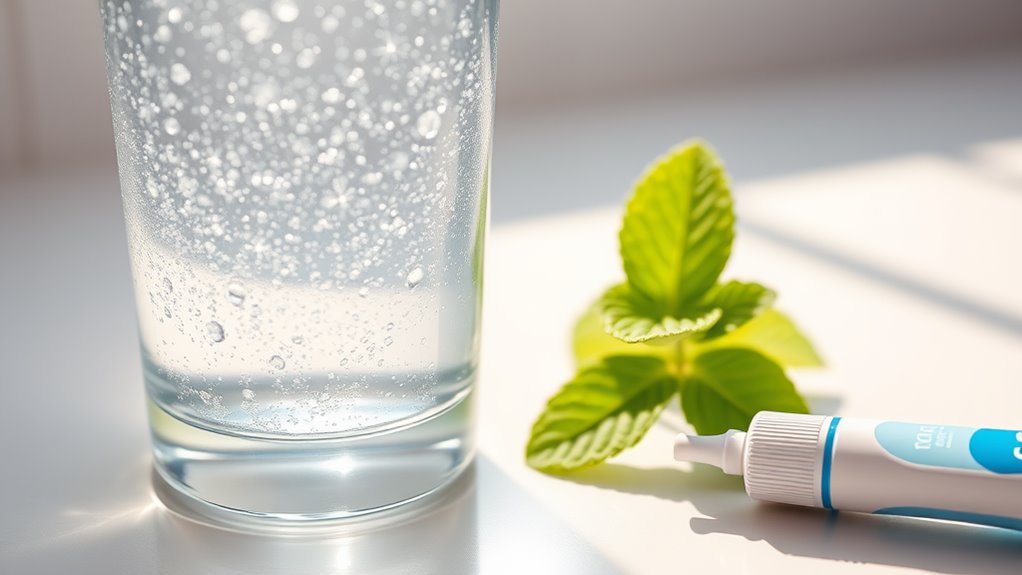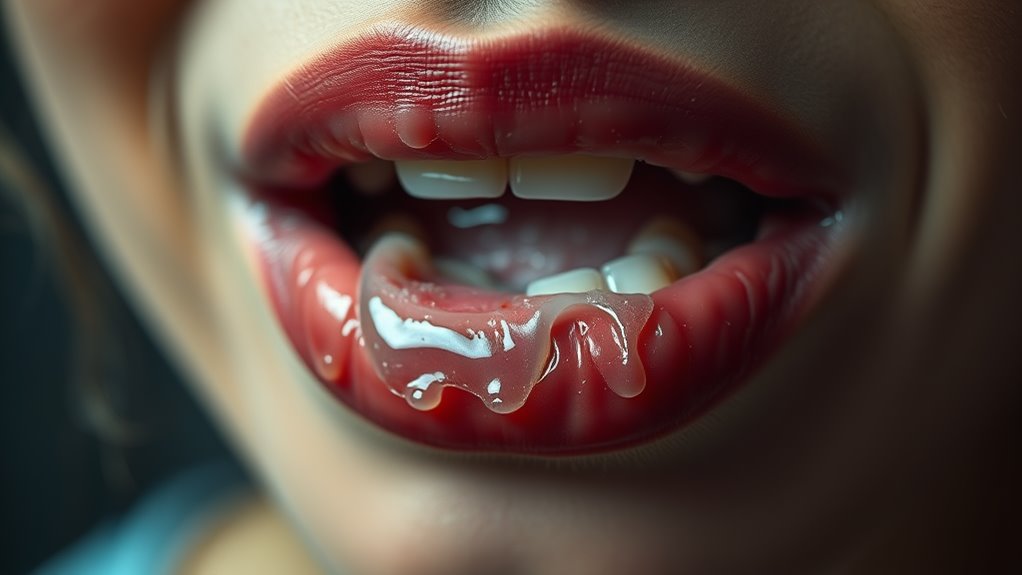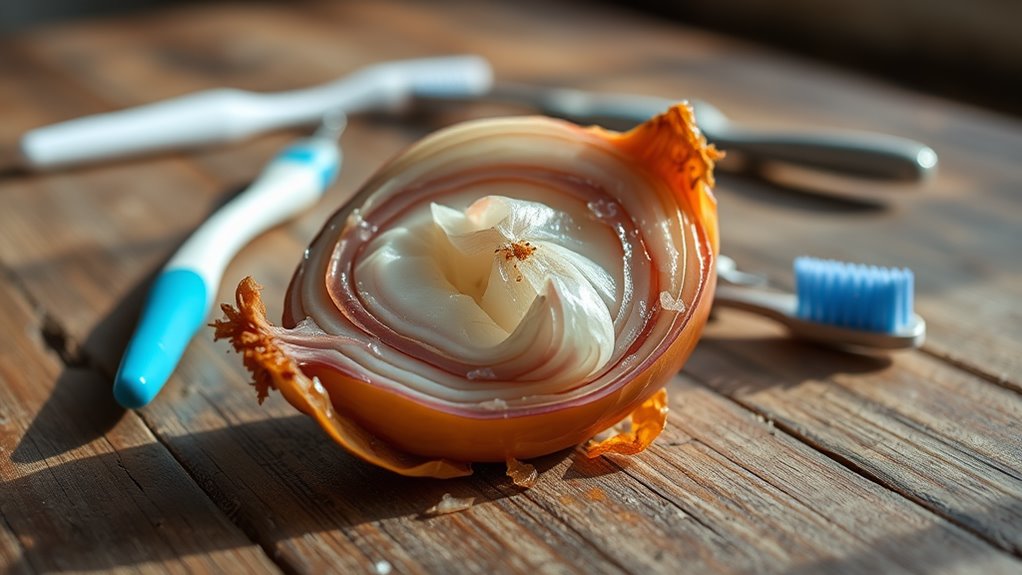Morning Breath This Simple Hack Will Fix It Instantly!
To instantly fix morning breath, try rinsing your mouth with a mixture of baking soda and water. This simple hack neutralizes acids and odors caused by bacteria that thrive overnight due to decreased saliva production. Chewing on sugar-free gum or fresh mint leaves can also freshen your breath throughout the day. Hydration plays a key role too, so drink plenty of water. Want to discover even more effective tips? There’s more to explore!
Understanding Morning Breath: Causes and Effects
When you wake up in the morning, you might notice that your breath doesn’t smell quite fresh. This unpleasant odor, often called morning breath, arises due to several factors.
While you sleep, saliva production decreases, allowing bacteria to thrive in your mouth. These bacteria break down food particles and release volatile sulfur compounds, leading to that distinctive bad smell you might find off-putting.
Additionally, if you mouth-breathe at night or consume certain foods before bed, you could enhance the problem.
The effects of morning breath go beyond just an annoying scent; it can impact your confidence and social interactions.
The Science Behind Oral Hygiene
While you might brush your teeth daily, understanding the science behind oral hygiene can greatly enhance your efforts in maintaining fresh breath and overall dental health.
Your mouth hosts billions of bacteria, some beneficial, others harmful. When food particles linger, these bacteria feast and produce acids, leading to plaque and bad breath.
Saliva plays an essential role, washing away debris and neutralizing acids. By brushing and flossing, you disrupt bacterial colonies and minimize plaque buildup.
Mouthwash can also help, as many contain antimicrobial agents that further reduce bacteria. Additionally, a tongue scraper removes debris from your tongue, where odor-causing bacteria thrive.
Common Remedies for Morning Breath
To combat morning breath effectively, you can turn to several common remedies that fit seamlessly into your routine. Here are some options that can help freshen your breath quickly:
| Remedy | How It Works | Tips for Use |
|---|---|---|
| Baking Soda | Neutralizes acids and odors | Mix with water for a mouth rinse |
| Mint Leaves | Provides a natural freshening effect | Chew on fresh leaves |
| Green Tea | Contains antioxidants and freshens | Sip warm or cold |
| Apple Cider Vinegar | Balances pH and kills bacteria | Dilute in water before rinsing |
| Sugar-Free Gum | Stimulates saliva production | Chew after meals |
Incorporating these remedies can make a noticeable difference in your morning breath!
The Importance of Hydration
Staying hydrated is essential for maintaining fresh breath and overall health. When you don’t drink enough water, your mouth produces less saliva, leading to dryness. This dryness creates an ideal environment for bacteria to thrive, which can cause bad breath.
By keeping yourself hydrated, you’ll support saliva production, which naturally cleanses your mouth and neutralizes odors.
Aim to drink at least eight glasses of water a day. If you exercise or spend time outdoors, increase your intake accordingly. You can also eat water-rich foods, like fruits and vegetables, to help with hydration.
Mastering Tongue Scraping Techniques
If you want to enhance your oral hygiene routine, mastering tongue scraping techniques can be a game changer.
Start by choosing a quality tongue scraper—metal or plastic works well. Gently stick out your tongue and place the scraper at the back, applying light pressure. Slide it forward to the tip of your tongue, removing any buildup. Rinse the scraper after each pass to keep it clean.
Aim to scrape two to three times, focusing on areas that feel rough. Don’t forget to be gentle; you don’t want to irritate your tongue.
Incorporating this simple technique into your daily routine can greatly improve your overall oral health and leave your mouth feeling fresher.
Instant Solutions for Fresher Breath
While you may already practice good oral hygiene, there are quick ways to boost your breath freshness throughout the day.
First, keep a travel-sized mouthwash handy. A quick swish can neutralize odors and leave your mouth feeling clean.
Chewing sugar-free gum is another effective trick; it stimulates saliva production, which naturally combats bad breath.
If you prefer a more natural approach, munching on crunchy fruits and veggies, like apples or carrots, can help scrub away food particles and bacteria.
Staying hydrated is essential too—drink plenty of water to wash away lingering odors.
Finally, don’t underestimate the power of breath mints or strips for a quick refresh before meetings or social gatherings.
These simple hacks can make a noticeable difference!
Maintaining Long-Term Oral Health
To maintain long-term oral health, it’s crucial to establish a consistent routine that combines proper hygiene with regular dental check-ups.
Start by brushing your teeth twice a day with fluoride toothpaste and don’t forget to floss daily. This helps remove plaque and food particles that can lead to cavities and gum disease. Additionally, consider using an antibacterial mouthwash to further combat bacteria.
Regular dental visits, ideally every six months, allow your dentist to catch any issues early. They can provide professional cleanings and personalized advice tailored to your needs.
Don’t overlook the importance of a balanced diet; limit sugary snacks and stay hydrated to promote saliva production.
Frequently Asked Questions
Can Diet Affect the Severity of Morning Breath?
Yes, your diet can greatly affect the severity of morning breath. Foods high in sugar or processed ingredients promote bacteria growth, while hydrating foods and fresh produce can help reduce odor and improve your oral health.
Are There Specific Foods to Avoid Before Bed?
Yes, you should avoid sugary snacks, acidic foods, and strong-smelling items like garlic or onions before bed. These can contribute to unpleasant odors and disrupt your oral hygiene, making your breath less fresh in the morning.
How Does Sleep Position Influence Morning Breath?
Your sleep position affects airflow and saliva production. Sleeping on your back can lead to snoring and mouth breathing, which dries your mouth. On your side, you might maintain better saliva levels, reducing morning breath.
Does Smoking Worsen Morning Breath?
Yes, smoking does worsen morning breath. It dries out your mouth, reduces saliva production, and introduces unpleasant odors. Quitting or cutting back can greatly improve your breath and overall oral health over time.
Can Certain Medications Lead to Bad Breath?
Yes, certain medications can lead to bad breath. They might cause dry mouth or alter your body’s natural bacteria balance. If you’re noticing this issue, it’s worth discussing your medications with your doctor for alternatives.




